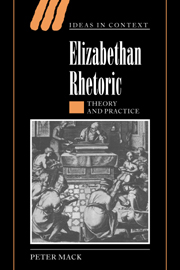Book contents
- Frontmatter
- Contents
- Acknowledgements
- Introduction
- 1 Rhetoric in the grammar school
- 2 Rhetoric and dialectic at Oxford and Cambridge
- 3 English-language manuals of rhetoric and dialectic
- 4 Everyday writing: notebooks, letters, narratives
- 5 Histories, conduct manuals, romances
- 6 Political argument
- 7 Elizabethan parliamentary oratory
- 8 Religious discourse
- Conclusion
- Bibliography
- Index of rhetorical and dialectical terms
- General index
- IDEAS IN CONTEXT
6 - Political argument
Published online by Cambridge University Press: 22 September 2009
- Frontmatter
- Contents
- Acknowledgements
- Introduction
- 1 Rhetoric in the grammar school
- 2 Rhetoric and dialectic at Oxford and Cambridge
- 3 English-language manuals of rhetoric and dialectic
- 4 Everyday writing: notebooks, letters, narratives
- 5 Histories, conduct manuals, romances
- 6 Political argument
- 7 Elizabethan parliamentary oratory
- 8 Religious discourse
- Conclusion
- Bibliography
- Index of rhetorical and dialectical terms
- General index
- IDEAS IN CONTEXT
Summary
Both in its educational institutions and in publications like Elyot's Book Named the Governor and Baldwin's Treatise of Morall Philosophie, Tudor humanism aimed to form men who could apply rhetorical skills and moral understanding to the problems of practical life. The Elizabethan Privy Council was dominated by moderately-born university-educated men like William Cecil, Nicholas Bacon, Walter Mildmay and Francis Walsingham who sat alongside hereditary peers and who were served by secretaries of state and ambassadors who shared their own background. The Privy Council considered large numbers of logically argued written reports. On important issues its members debated carefully worked out positions before reporting their proposals to the Queen. The culture of argument, which has been described in earlier chapters, prescribed the methods and provided the criteria of political decision-making.
Both the materials presented to the Privy Council and its processes of argument have generated a rich documentary record. In this chapter I analyse the argumentative and rhetorical procedures employed in letters of political advice (mainly from diplomats overseas), in William Cecil, Lord Burghley's political memoranda composed throughout his career, in speeches and notes from Privy Council debates and in the Earl of Essex's Apology, a long political pamphlet connected with debates in the Privy Council in 1597 and 1598 about a possible peace treaty with Spain. Parliamentary oratory and debate, which is related in subject-matter and personnel but which survives in different types of record, will be the subject of the next chapter.
- Type
- Chapter
- Information
- Elizabethan RhetoricTheory and Practice, pp. 176 - 214Publisher: Cambridge University PressPrint publication year: 2002



